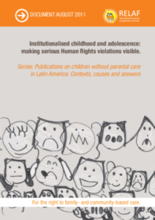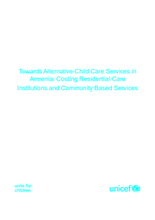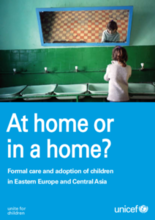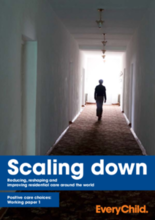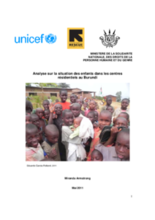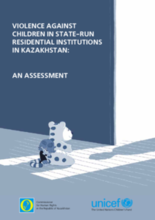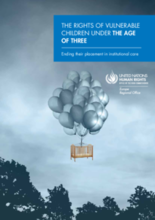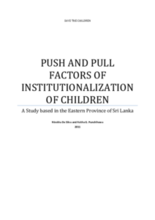Displaying 631 - 640 of 771
This paper, produced by RELAF, is part of a series of publications on children without parental care in Latin America: Contexts, causes and answers. This document, and others in the series, pertains to the broad topic of children without parental care and examines the particular situation of institutionalised children.
This recent study by UNICEF in Armenia costed different types of residential care and community based services.
Press release from UNICEF and OHCHR launching a joint campaign to put an immediate end to the practice of placing young children into State-run infant homes.
Published by UNICEF, the report At Home or in a Home, provides an overview of the major trends and concerns about children in formal care and institutions as well as adoption Central and Eastern Europe and Central Asia.
Adolescents living in orphanages are at a disadvantage with respect to mental health. The aim of this study was to assess the distribution of psychological symptoms and their association with the level of physical activity (PA) in adolescents living in orphanages.
This paper summarizes the evidence base on residential care to promote better decision making among policy makers and child welfare practitioners
Le Gouvernement du Burundi, en collaboration avec l’UNICEF et l’ONG International Rescue Committee (IRC), a prévu de faire un état de lieux des centres résidentiels pour les enfants.
This study on violence against children in state-run residential institutions in Kazakhstan was conducted under the national Office of the Commissioner for Human Rights and UNICEF. Data was collected from six different types of state run- residential institutions for children in 3 regions using a multi-methods approach, including surveys with children ( 9-18 years old) and staffs, and interviews with young people (17-23 years old) who had left the care of these institutions.
This document was commissioned by the Regional Office for Europe of the Office of the United Nations High Commissioner for Human Rights (ROE OHCHR). One of its aims was to stimulate discussion at the Sub-Regional Workshop on the Rights of Vulnerable Children Aged 0 to 3 Years in Prague on 22 November 2011.
This research on the institutionalization of children in the Eastern Province of Sri Lanka was carried out by Save the Children with the support of the Department of Probation and Children Care Services and National Institute of Social Development.

